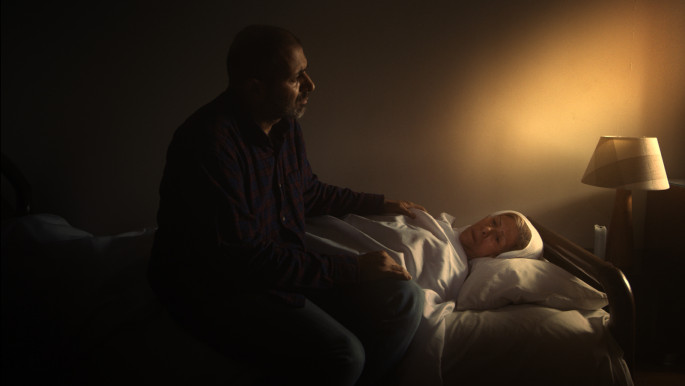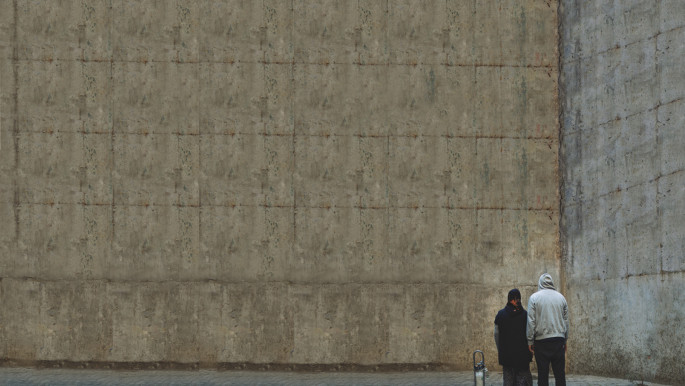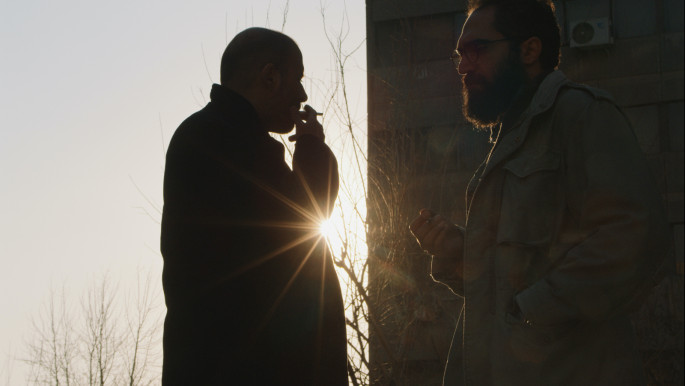District Terminal: A dystopic tale of nihilism and hopelessness
The feature, world-premiered in the Encounters section of this year's online edition of the Berlin International Film Festival (1-5 March 2021) and staged by Iran's Filminiran and Germany's PakFilm, is set in a gloomy future where high levels of pollution and a lethal virus have reduced Tehran to a wasteland and forced most of the population to emigrate or live in quarantine.
Shot before the beginning of the outbreak, the story of this psychological science fiction film centres on a forty-something man called Peyman (played by one of the directors, Yadegari), a desperate poet trying to quit his heroin addiction by attending several Narcotics Anonymous meetings and living with his mother (a caring, but disillusioned Farideh Azadi), a retired teacher.
Peyman spends his life in a sort of time loop, living with the hope of publishing his book, but constantly fearing censorship, having more or less deep conversations with his closest friends, Ramin (Ali Hemmati) and Mozhgan (Gandom Taghavi) and taking photos of urban decay.
His pictures depict the corners and the buildings of a spectral Tehran.
Meanwhile, he dreams naively to reach a woman living in the United States whom he has married in order to emigrate and shares his drug addiction with his teenage step-daughter.
The narrative context is that of a near future Iran, devastated by smog storms, increasing poverty, drought and a tyrannical government.
News from the outer world are delivered or suggested sparingly, but effectively; a yellowish fog behind the windows, some archive footage accompanied by Peyman's voice over reflecting on past events or even simple conversations – during an exchange with Ramin, for example, Peyman gets to know that China has recently cloned its first man.
However, what makes this work even more appealing is its distorted spatio-temporality.
The movie is interspersed with several oneiric sequences making viewers constantly doubt about what is happening in the present time, what has already happened and what is simply being imagined by Peyman, a man who, after all, will never be able to quit his addiction.
 |
|
 |
 |
In one of these sequences, for example, we see the Ministry of Guidance's censor clerk evaluating Peyman's manuscript, asking him to cut out or amend most of its "controversial" content and gradually driving him crazy.
In other recurring scenes, instead, we see the poet being surrounded by quarantine officers or watering a plant from his lover with his own blood.
Two are the main flaws affecting Bardia Yadegari and Ehsan Mirhosseini's overall quality of the picture. The first is its narrative pace, which makes District Terminal, at times, a draining viewing experience.
This mostly happens because there is very little character development to observe and the whole story revolves around frustration and hopelessness.
After all, Peyman enters a sort of downward spiral that does not come as a surprise for the spectators; meanwhile, all of the other characters either gradually disappear or keep their lives substantially unchanged.
This is probably a deliberate choice serving the purpose of highlighting the directors' (contemporary) resignation of living in a strict regime that does not allow artists and writers to express and create freely.
The feeling is certainly well conveyed and the film offers sporadic moments of sarcastic humour or sweetness, but it may fail to keep some spectators hooked.
In visual terms, however, said bleakness gifts striking, diversified imagery.
Under the filmmaking duo's elegant direction, Navid Moheimanias' cinematography span symmetrical Ozu-like close-ups, beautiful chiaroscuros, low-key lighting, toned-down palettes and several claustrophobic aerial shots where Peyman appears as caged and surrounded by apartment blocks.
Besides, District Terminal features many other aesthetic solutions worth discovering, and this is at least one good reason for hardcore cinephiles to watch this film.
A grim, majestic atmospheric score composed by Alireza Shams Eskandari (here also serving as the film's sound recordist) enriches the experience, along with some delicate touches of light-hearted melancholy added by songs such as legendary Farhad Mehrad's cover of Gilbert O'Sullivan's 1972 hit Alone Again (Naturally) or Albert Ayler's version of Summertime.
Davide Abbatescianni is an Italian Film Critic and Journalist based in Cork, Ireland.
Follow him on Twitter: @dabbatescianni





 Follow the Middle East's top stories in English at The New Arab on Google News
Follow the Middle East's top stories in English at The New Arab on Google News


